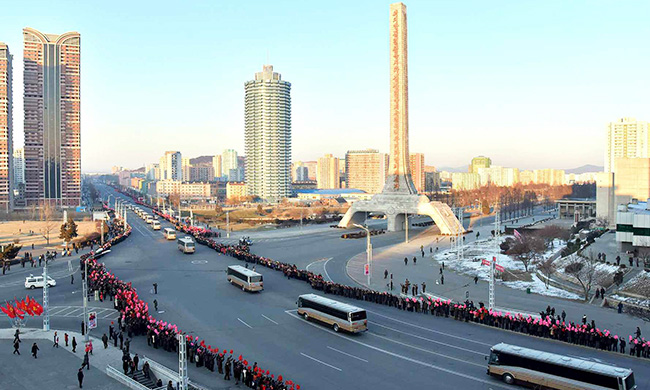- California Assembly OKs highest minimum wage in nation
- S. Korea unveils first graphic cigarette warnings
- US joins with South Korea, Japan in bid to deter North Korea
- LPGA golfer Chun In-gee finally back in action
- S. Korea won’t be top seed in final World Cup qualification round
- US men’s soccer misses 2nd straight Olympics
- US back on track in qualifying with 4-0 win over Guatemala
- High-intensity workout injuries spawn cottage industry
- CDC expands range of Zika mosquitoes into parts of Northeast
- Who knew? ‘The Walking Dead’ is helping families connect
Korea, US intelligence capabilities in question
NK nuke test reveals poor monitoring by Seoul, Washington

Buses carrying nuclear scientists, military officials and construction workers line a street in Pyongyang while residents cheer after North Korea conducted a fourth nuclear test on Jan. 6. Up to 100,000 citizens were mobilized for the event. North Korea’s Rodong Sinmun newspaper published the photograph on Thursday. (Yonhap)
By Yi Whan-woo
The intelligence gathering capabilities of South Korea and the United States have been called into question after President Park Geun-hye insisted Wednesday that neither Seoul nor Washington detected advance signs of North Korea’s latest nuclear test last week.
If Park’s claims are true, it could be interpreted that North Korea is preparing to conduct additional tests in the future without this being detected by the allies.
In an address to the nation, Park denied speculations that Washington may have known about Pyongyang’s fourth nuclear test in advance but did not share this with Seoul.
The President said it was not foreseeable by the intelligence agencies of the two allies that the secretive state would conduct its first claimed hydrogen bomb test in a tunnel located in Punggye-ri, Hamgyong Province on Jan. 6.
She added that there were “no particular nuclear activities” prior to the test similar to those detected prior to Pyongyang’s third nuclear test conducted in 2013. The military regime also carried out such tests in 2006 and 2009.
Park’s comment has spurred concerns that the two allies are not ready to prevent the Kim Jong-un regime from pursuing its nuclear ambitions as the repressive state has apparently made advances in its nuclear technology over the years.
“It must have been disgraceful for the President to reveal shortcomings about obtaining information related to Pyongyang’s nuclear program,” said Yang Moo-jin, a professor at the University of North Korean Studies. “Under such circumstances, I believe what Park said was 100 percent true and that this shows Seoul and Washington are failing in their intelligence operations, individually and at the joint level.”
Kim Yong-hyun, a professor of North Korean Studies at Dongguk University, expressed a similar view.
“I won’t comment about the intelligence capabilities of the U.S. but it’s certain that South Korea is faltering in its efforts to collect information on North Korea on its own,” he said. ‘It also can be said that joint intelligence operations between the two allies are not functioning properly.”
Park Won-gon, an international relations professor at Handong University said, “We need something other than satellites and other surveillance devices in order to prevent Pyongyang from conducting a fifth nuclear test.”
In a news report published by Pyongyang’s state-controlled Korean Central News Agency (KNCA) on Dec. 10, Kim Jong-un said his country “is capable of detonating an H-bomb as a nuclear state.”
The KNCA also reported on Jan. 6 that that the Supreme Leader signed an order to issue the “thunderclap of an H-bomb” on Dec. 15.
This was three days after Pyongyang’s Moranbong Band, an all-female propaganda pop group, abruptly cancelled a tour of China and returned home without explaining why.
Seoul’s Ministry of Defense and National Intelligence Service (NIS) acknowledged that they remained unaware of preparations by Pyongyang to conduct its purported hydrogen bomb test.
But they refuted an NBC report and even claimed that U.S. Forces Korea commander Gen. Curtis Scaparrotti was not aware of the surprise test.
Citing a senior U.S. military official, U.S. broadcaster NBC reported on Jan. 6 that Washington was “aware of test preparation for two weeks and launched drones to get a baseline air sample near the site.”















